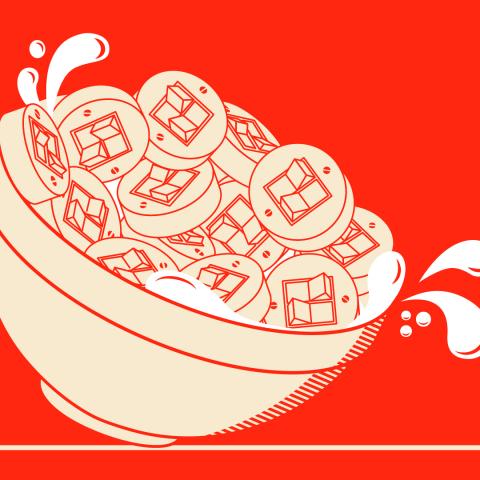
For the seventh time, the DOK Neuland experience will be part of DOK Leipzig. From 26 to 31 October, a total of ten works produced in 15 countries will be presented at the Museum of Fine Arts (MdbK), including four 360° films and six VR experiences. Based on the observation that the pandemic has upset the usual expectation of control and order everywhere in the world, this exhibition raises the question of what potential lies within chaos.
“Last year, we observed a heightened longing for clarity and the ability to control things,” say curators Lars Rummel and Marie Hinkelmann, “but the world is constantly changing anyway. So we realised that the apparent normality that people are longing for is the greatest illusion of our existence.”
The climate crisis, the shifting of many aspects of life into the digital realm, the relationships that have changed between man, machine and nature in posthumanism and the inequality in global living conditions demand a lot from humanity: that’s the thesis of the exhibition. Some things seem uncontrollable and unpredictable, but without chaos, it would not be possible to notice the opposite, namely the convenience of order. “We don’t want to deny any realities or look away, yet every dystopia can be turned into a utopia. Because where uncertain circumstances prevail, there is also the potential for new creative energies and the emergence of resilience,” Lars Rummel continues. “We have therefore selected works that refer to the unknown and the unplanned. In doing so, however, we are not trying to tame chaos. Rather, using the slogan ‘No chaos, no change’, we seek to embrace it and see it as an opportunity for developing new strategies for engaging with the world.”
In collaboration with the artist Paula Gehrmann, a scenography has been created that turns the exhibition space into an experiential place where visitors can examine their individual relationship to chaos.
The exhibition consists of three parts. In the first, which can be summarised under the title “Present Chaos”, three 360° films present an assessment of the way things are now. Revelation 360 by Reed O’Beirne ponders what the digital realm in which we operate actually is. We are challenged to use our imagination to see more than is shown. Reeducated reconstructs through animation the memories of three men who endured political indoctrination and torture in a re-education camp in the Xinjiang region of China. The essay film Handwritten presents a collage of how the pandemic has altered human relationships and brought people’s everyday lives into the digital realm and at the same time into a state of loneliness.
In the second part, entitled “Transformation”, the VR work Infomorph confronts the audience with an artificial intelligence designed to facilitate the transition to the digital realm. Text, image and sound generated by algorithms usher in a speculative scenario in which an analogue world is neither possible nor necessary. Based on the dystopia that the devastated Earth no longer offers any living space, the VR work Samsara takes the audience into outer space. But there, time is only an illusion, people’s consciousness becomes a collective experience, their DNA is moulded into new life forms and a cycle of endless reincarnation begins. They Dream in My Bones (Insemnopedy II) also deals with the imprinting of humans by their DNA. The 360° film tells the story of a fictional researcher who tries to extract dreams from a skeleton and in the process questions the conventional notions of gender and identity.
The third category, “Beyond Chaos”, contributes a further narrative. In these four works, hierarchies are inverted and light is shed on processes of transformation. The multiplayer VR experience Atomu invites us to witness a ritual of the Kikuyu community in Kenya, in which a man can become a woman and a woman a man. In the process, it follows a genderless person in search of the most genuine version of themselves. The VR work Kykeon was also inspired by ritual practices. Here, dance and VR technology are combined to explore the meaningful potential that ancient rites of different cultures may have for future societies. Hush takes the audience on a meditative journey into Norse mythology. As the world dissolves, the VR experience takes visitors underwater to a lost universe. Finally, Tangible Utopias: Urban Futurism makes fantastical and imaginative living spaces accessible. It creates a walkable urban utopia based on the imagination of 250 children.
The exhibition is open from Tuesday to Sunday from 12 noon to 6 pm and on Wednesday until 8 pm. Admission is free. Furthermore, on Tuesday and from Thursday to Sunday between 10 am and 12 noon, accredited professionals will have an additional opportunity to visit DOK Neuland. MdbK’s rules of admission apply. It is not necessary to book a time slot this year. Admission is via the museum entrance.
DOK Neuland has been supported by ARTE since its first edition. The European culture channel is committed to using new digital technologies for innovative storytelling. DOK Neuland is supported by MDR Media. DOK Neuland is part of the DOK young talent programme and is carried out in cooperation with SLM, the Saxon State Authority for Commercial Broadcasting and New Media. As in previous years, the premises are being made available by MdbK. DOK Leipzig also thanks the US Consulate in Leipzig for its support and Sennheiser for the headphones. This year, DOK Neuland is supported by HTC Vive. From 26 October to 14 November, the VR experiences will be available via the online Viveport platform from anywhere in the world from the comfort of your own home, using your own headset.
Please find the selection of Extended Reality works here: DOK Neuland 2021
You can find the DOK Neuland trailer here: DOK Neuland Trailer